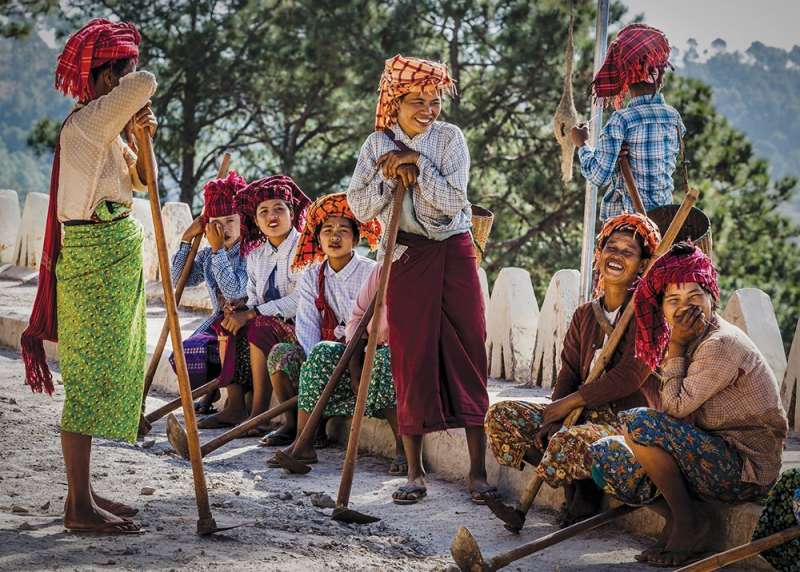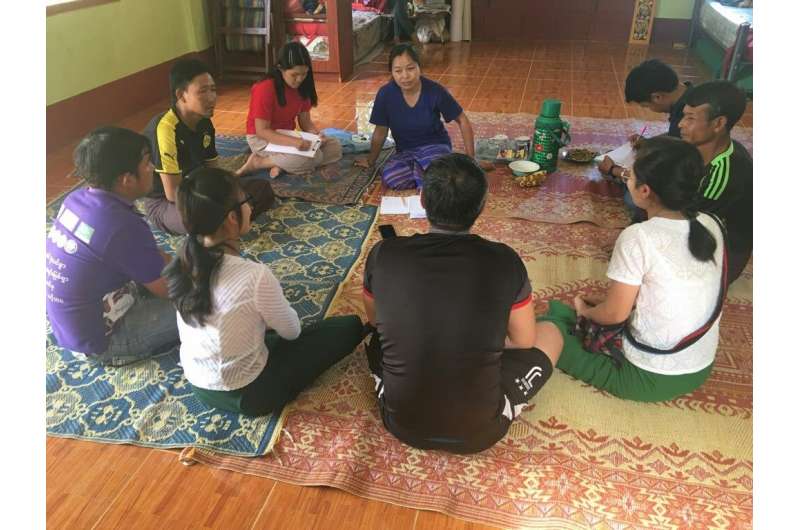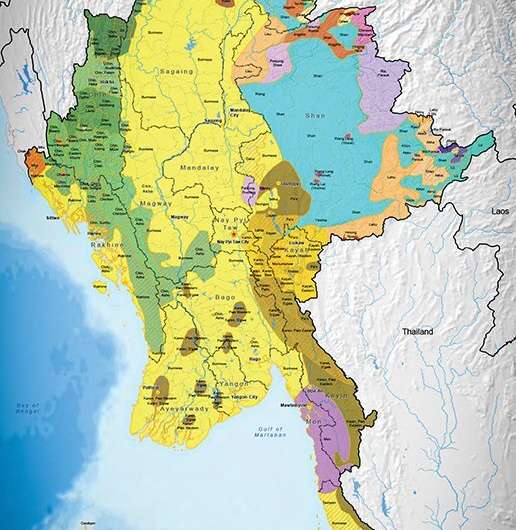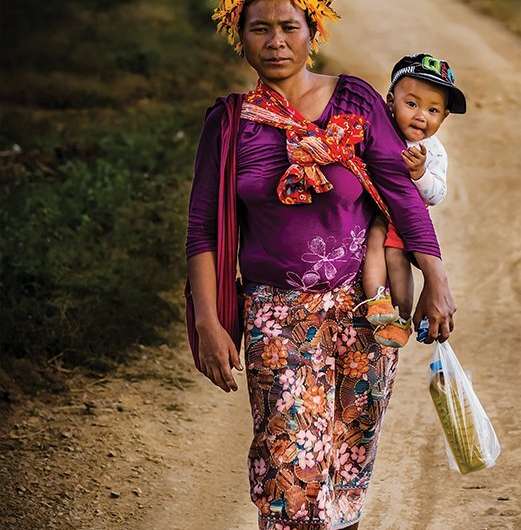Women in Shan state, a region that spans seven ethnic groups and nine languages. Credit: Phuong Nguyen Duy | 123rf
Social scientists in Myanmar seeking to understand the factors that influence women's participation in politics and the economy are finding that, before they can study, first they must inform.
The words 'gender equality' are not really in the Burmese language, nor in the more than 200 other languages and dialects spoken in the ethnically diverse country of Myanmar.
This poses a challenge to researchers in Myanmar studying gender equality concepts—such as women's participation in politics and economic opportunities—as part of Knowledge for Democracy Myanmar (K4DM), a five-year research initiative supported by Canada's International Development Research Centre (IDRC).
"It's a new concept," says Whitney Huntley, a social scientist at the Myanmar Institute for Integrated Development (MIID), one of the five groups studying gender issues for K4DM. "This project has allowed communities to reflect on gender dynamics and power."
Shifting mindsets
MIID is seeking to learn how decisions are made within households and local villages in Shan state, a region spanning seven ethnic groups and nine languages. The non-profit trains local community members to conduct formal research interviews and focus group discussions in their own communities and languages.
In addition to research methodology training, the community members requested more information to better understand gender equality concepts.
MIID partnered with another leading research group in Myanmar and a K4DM participant, Gender Equality Network (GEN), to provide gender awareness training. The trainings highlighted how assumptions about gender roles are built into cultural norms and how, while sometimes discrimination or imbalances can be obvious, many times they are more subtle.
Attitudes and mindsets are already beginning to shift.
"I used to see women are those who are lower than man. Now I know that both men and women are equal," said one man from the Parami Development Network from the southern Shan region, after the training.
Small focus group discussions are a primary social science research method to gather insights from real people about key issues. Credit: MIID
A woman from Mawk Kon Local Development Organization in eastern Shan shared how she learned gender norms are built into almost everything.
"I also realized that sometimes what I [say] can be considered as discrimination, although I did not really intend to do so," she said.
Now, both women and men are analysing their own organisations for ways to improve gender equality and sharing what they've learned with their communities.
Highlighting the unknown
Other organisations working with IDRC's K4DM initiative report similar experiences of raising awareness in the course of their research. For example, the Myanmar Institute of Gender Studies (MIGS) is surveying men and women about their budget preferences. When the researchers asked how local, state and national governments should allocate money for public services, such as education, healthcare and infrastructure, they found many respondents had no expectation that governments could spend on services traditionally handled by women, including childcare or eldercare.
Khin Ma Ma Myo, director of MIGS, explains that, along with collecting high quality data, they are raising awareness about how gender equality is not just a human rights issue, but can be prioritized throughout government sectors in the way funding is allocated.
In other cases, research is likely to help raise awareness about blind spots once results come out. Enlightened Myanmar Research Foundation (EMReF) is analysing how political parties recruit and nominate candidates, particularly women. Initial findings show the need for clear policies or programs to encourage more female candidates to run for office.
Building a robust research culture
Myanmar held its first openly contested elections since 1988 in November 2015. To support the transition to a robust democracy, IDRC's K4DM initiative aims to emphasize evidence-based policies and boost women's participation at all levels of policymaking.
Part of this effort is building research capacity within the country: providing people in Myanmar the skills and tools to conduct social science research. The five non-profit groups participating in K4DM are training others who help carry out the research. This also helps lead to stronger social science research, which relies on honest responses.
"When asking sensitive questions about gender equality in ethnic communities, there has to be trust," says MIID's Huntley. "Having local people do the research in their own language is important, both to respect community leaders and to generate quality data."
Myanmar is an ethnically and linguistically diverse country, with more than 200 languages and dialects. The map above shows where different languages are spoken, according to self-reported data collected by Ethnologue and the Language & Social Development Organization. This diversity presents a challenge for social science researchers to ensure survey questions have consistent meanings across languages. The teams supported by K4DM work specifically in the following languages and dialects: Shan (3 dialects: Tai Khun, Tai Loi, Tai Li), Ta-ang (Rojin), Lahu, Akha, Danu, Pa-O (Taungyoe), Intha, Chin, Kayin, Burmese and English. Credit: Myanmar Information Management Unit
Overcoming challenges
There are still many challenges to conducting research in Myanmar. For example, if researchers want government and policymakers to accept their study results as legitimate and to take action, they typically need prior approval from one or more government agencies for their projects. This can be difficult and cause delays, but some see a silver lining.
"We really want our research to be translated into policy, not sit on the shelf, so we work together with policymakers in every stage of the project in order to make sure they are on board from the beginning and feel like it is their project," says Soe Myat Tun, a researcher at Gender Equality Network (GEN), which is analysing the barriers and pathways to women's participation in politics at the local, state and national levels.
Among other challenges for researchers: transportation to villages around the country can be extremely difficult and safety concerns due to ongoing conflicts. Sometimes local leaders or community members worry that they could lose their jobs if they answer questions, or are suspicious of how the information will be used. A lot of time is also spent translating survey questions into multiple languages to ensure that they mean the same thing, thus making the data comparable.
The Myanmar Institute for Peace and Security (MIPS) is surveying men and women about service delivery, such as healthcare, security and education, and how those services are impacted by decentralization and ethnic conflicts. MIPS executive director Min Zaw Oo previously managed research field surveys in war zones for the US government.
"That was easier than field surveys in Myanmar," he says.
Growing optimism
The researchers are working to overcome the challenges and plan to report their findings next year. While conducting research in the field can be difficult, there is an air of optimism around increasing levels of curiosity and openness.
This was especially apparent at a social science research conference about managing challenges during Myanmar's transition to democracy, held at the University of Yangon in 2019. Researchers from Myanmar, Australia and China presented their work and openly exchanged ideas with members of the public and university students. Charlotte Galloway, director of Australia National University's Myanmar Research Centre, which co-hosted the conference, notes the change.
"We couldn't have had a forum anything like this even three or four years ago," she says. "Not for lack of interest by academics; the environment did not allow it."
The conversations are happening. Questions are being asked. Mindsets are shifting. Now, all eyes are on the 2020 elections to see what's next for Myanmar, its democracy and its research environment.
Credit: ostill/123rf
Myanmar's gender equality gap by the numbers
88
- Ranking on the Global Gender Gap Index, which measures gender disparities across health, education, economic and political criteria, and ranks 149 countries from the smallest to largest gender gaps.
31%
- The national gap between women's resources and opportunities compared to men's, about the global average.
133
- Global ranking for equal political empowerment out of 149 countries, the least equal in Asia.
12%
- Percentage of women in parliament in 2019, according to the Inter-Parliamentary Union.
Provided by International Development Research Centre (IDRC)


























